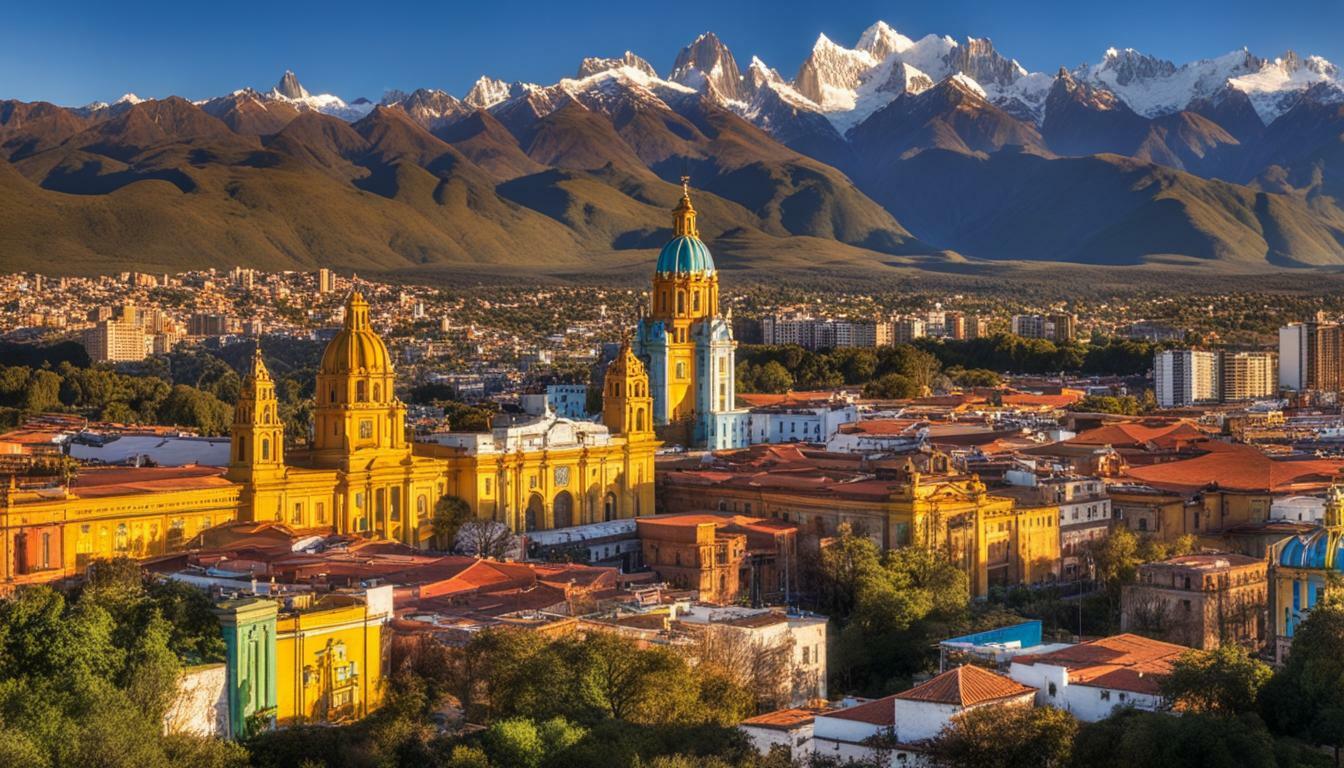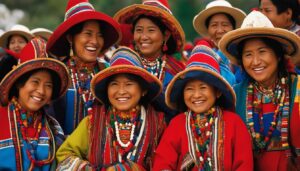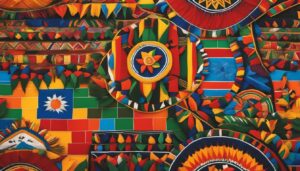Argentina is a culturally diverse country with a rich linguistic heritage. The official language spoken in Argentina is Spanish, specifically a unique form called Argentinian Spanish. It is mutually intelligible with Spanish spoken in other countries but has its own distinct characteristics. The largest dialect in Argentina is Rioplatense or Porteño Spanish, which is spoken primarily in the basin of the Río de la Plata. Additionally, there are many other languages spoken in Argentina, including indigenous languages like Quechua, Guarani, and Mapudungun, as well as immigrant languages like Italian, German, Arabic, Yiddish, Catalan, and more. However, Spanish is the most widely spoken language in the country.
Key Takeaways:
- Argentina’s official language is Spanish, specifically Argentinian Spanish.
- Rioplatense or Porteño Spanish is the largest dialect spoken in Argentina.
- Argentina also has indigenous languages like Quechua, Guarani, and Mapudungun.
- Immigrant languages like Italian, German, Arabic, Yiddish, and Catalan are also spoken in Argentina.
- Spanish is the most widely spoken language in Argentina.
Spanish in Argentina: A Cultural and Linguistic Marvel
Spanish holds a prominent place in Argentina’s cultural landscape, serving as the primary language spoken by a vast majority of the population. Argentinian Spanish, known for its unique characteristics, adds a distinct flavor to the language. While it is mutually intelligible with Spanish spoken in other countries, it has its own linguistic nuances that reflect the rich cultural heritage of Argentina.
In addition to Argentinian Spanish, there are various other languages spoken in Argentina, contributing to the country’s linguistic diversity. Indigenous languages such as Quechua, Guarani, and Mapudungun have deep roots in Argentina’s history and are still spoken by many indigenous communities today. These languages, with their cultural significance, add to the tapestry of Argentina’s linguistic heritage.
Furthermore, Argentina is home to a diverse immigrant population, bringing with them their own languages and dialects. Languages like Italian, German, Arabic, Yiddish, and Catalan have influenced the linguistic landscape of the country, reflecting the historical waves of immigration that have shaped Argentina’s culture. This linguistic diversity is a testament to Argentina’s identity as a melting pot of cultures and languages.
| Languages spoken in Argentina: | Percentage of Population |
|---|---|
| Spanish | 99% |
| Quechua | 8% |
| Guarani | 2% |
| Mapudungun | 1% |
| Other Indigenous Languages | 3% |
| Other Immigrant Languages | 15% |
The linguistic landscape of Argentina, with Spanish at its core, reflects the country’s diverse history and cultural heritage. It is a testament to the blending of indigenous, immigrant, and local influences, making Argentina a linguistically fascinating and vibrant country.
The Linguistic Tapestry of Argentina
In addition to Spanish, Argentina boasts a fascinating array of indigenous and immigrant languages that contribute to its unique linguistic tapestry. The country’s cultural and historical diversity is reflected in the wide range of languages spoken by its population.
Among the indigenous languages spoken in Argentina, Quechua, Guarani, and Mapudungun are the most prominent. Quechua, originating from the Inca civilization, is spoken by a significant number of people, especially in the northwestern regions of the country. Guarani, which has official status in Paraguay and is widely spoken in the border regions of Argentina, is another significant indigenous language. Mapudungun, spoken by the Mapuche people in the south, also adds to the linguistic richness of Argentina.
Furthermore, Argentina has been a destination for immigrants from various countries, resulting in the presence of immigrant languages. Italian, German, Arabic, Yiddish, Catalan, and many other languages have found a place in Argentina’s linguistic fabric. These immigrant languages reflect the diverse waves of migration that have shaped the country’s history, adding depth to its cultural heritage.
| Indigenous Languages | Immigrant Languages |
|---|---|
| Quechua | Italian |
| Guarani | German |
| Mapudungun | Arabic |
| Yiddish | |
| Catalan |
Despite the linguistic diversity in Argentina, Spanish remains the most widely spoken language and serves as the official language of the country. It is essential for communication, business, and education, playing a central role in both public and private spheres of Argentine society.
Porteño Spanish: Unraveling the Distinctive Dialect
Within Argentina, the Porteño Spanish dialect, also known as Rioplatense Spanish, is the largest and most influential variant of the language, primarily spoken in the Río de la Plata region. This unique dialect has its roots in the immigration waves that brought Europeans, particularly Italians and Spaniards, to the region in the late 19th and early 20th centuries.
The Porteño Spanish dialect is characterized by its distinct pronunciation, vocabulary, and intonation patterns. In contrast to other Spanish-speaking countries, Porteños tend to pronounce the double “ll” and “y” sounds as a soft “zh” or “sh” sound, reminiscent of Italian. They also have a tendency to drop the final “s” in plural nouns and verb conjugation, making their speech sound more fluid and melodic.
Moreover, Porteño Spanish incorporates numerous Italian loanwords and expressions into its vocabulary, thanks to the strong Italian influence in the region. It is not uncommon to hear Porteños using Italian words like “ciao” (hello/goodbye), “pasta” (pasta), or “pizza” (pizza) in everyday conversations.
A Glimpse into Porteño Vocabulary
| Porteño Term | English Translation |
|---|---|
| Bondi | Bus |
| Chamuyar | To sweet talk |
| Facha | Style/looks |
| Lunfardo | Slang |
| Laburar | To work |
The Porteño Spanish dialect is not only a linguistic phenomenon but also a reflection of Argentina’s rich cultural heritage. It is deeply ingrained in the identity of the people of Buenos Aires and the surrounding areas, shaping their way of communicating and expressing themselves. Understanding Porteño Spanish is like unraveling the colorful tapestry of Argentine language and culture, offering a glimpse into the unique linguistic heritage of this captivating country.
As we explore the linguistic landscape of Argentina, it becomes clear that the country’s language diversity goes beyond Spanish. Indigenous languages like Quechua, Guarani, and Mapudungun, as well as immigrant languages such as Italian, German, Arabic, Yiddish, and Catalan, have all contributed to the linguistic tapestry of Argentina. However, it is Spanish, particularly the Porteño dialect, that prevails as the most widely spoken language, uniting the country and serving as a testament to Argentina’s multicultural roots.
Conclusion
In conclusion, Argentina’s official language is Spanish, specifically a unique form known as Argentinian Spanish. This language is mutually intelligible with Spanish spoken in other countries, but it has its own distinct characteristics that make it truly remarkable.
However, Argentina’s linguistic landscape is not limited to Spanish alone. The country is also home to a rich array of indigenous languages such as Quechua, Guarani, and Mapudungun. These languages are a testament to the cultural diversity and heritage of the indigenous communities in Argentina.
Furthermore, Argentina has been influenced by various immigrant languages throughout its history. Languages like Italian, German, Arabic, Yiddish, and Catalan have left their mark on the country’s linguistic tapestry, adding yet another layer of richness to its language ecosystem.
Despite the presence of these diverse languages, Spanish remains the most widely spoken language in Argentina. It serves as a unifying force that connects people from different regions and backgrounds, forming the linguistic backbone of the nation.
FAQ
What language do they speak in Argentina?
The official language of Argentina is Spanish, specifically a unique form called Argentinian Spanish.
Are there any other languages spoken in Argentina?
Yes, besides Spanish, there are many other languages spoken in Argentina. Some of these include indigenous languages like Quechua, Guarani, and Mapudungun, as well as immigrant languages like Italian, German, Arabic, Yiddish, Catalan, and more.
Is Argentinian Spanish different from Spanish spoken in other countries?
While Argentinian Spanish is mutually intelligible with Spanish spoken in other countries, it does have its own distinct characteristics. The largest dialect in Argentina is Rioplatense or Porteño Spanish, which is spoken primarily in the basin of the Río de la Plata.
Which language is the most widely spoken in Argentina?
Spanish is the most widely spoken language in Argentina.



